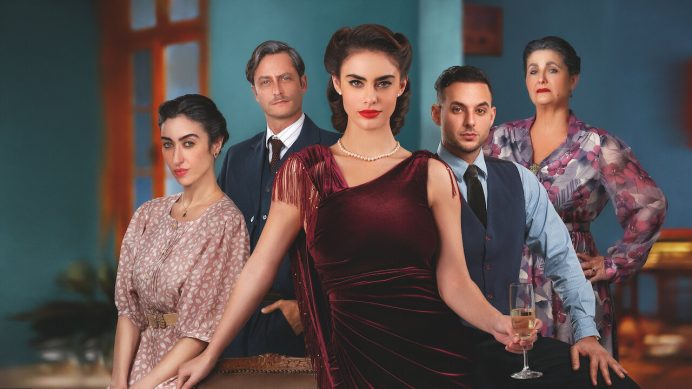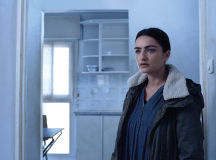Noga Emanuel reviews the TV series The Beauty Queen of Jerusalem, a dramatic adaptation of Sarit Yishai-Levy’s bestselling novel of the same title, set in the Jerusalem of the 1920s and 1940s. She finds a ‘jousting between frivolous liberating modernity and rigid traditions of cultural convention’ that takes the viewer back to ‘a time and a place where every single aspect of life, community and country is in a flux’.
It can be watched on Netflix.
Overture: How do you say ‘gay’ in Ladino?
Mercada Ermoza is the grand matriarch of an old Sephardic family in Jerusalem. She has been a widow for over 20 years, ever since her husband, Rafael, died of a heart attack when he heard his son, Gavriel, was in love with an Ashkenazi girl (Rochel). Mercada, whom Jane Austen would have described as ‘handsome’, is a tall statuesque high-handed dame who rules her family according to the strict code of Mediterranean respectability. Without her business acumen and alertness, Gavriel would have been quite lost running the family store ‘The Delicatesse’. But Mercada is lonely and not yet sixty years old. Her daughter in law, Rosa, is asserting her own will and agency in the family hierarchy, and projects business-acumen that outstrips Mercada’s. Her three granddaughters have grown up and are in no need of her chaperonage. And Gavriel… who knows what’s going on with him? One day Mercada escorts Luna, her recently-wedded eldest granddaughter, to the clothing store where she is employed and meets Luna’s boss, the congenial, polite and neat Mr. Zacks who, she finds out, is a bachelor and her contemporary. Zacks admires her beauty, accusing Luna of not warning him that she has brought Greta Garbo to his shop, and admires her cooking. Mercada sets her cap at Mr. Zacks and asks Luna to act as match-maker. But, Luna reminds her, Mr. Zacks is an Ashkenazi German-Jew and Mercada is adamant in her aversion to Ashkenazi Jews infiltrating the family. At her age, Mercada indulgently explains, such imperatives are null and void.
Luna, the eponymous ‘Beauty Queen of Jerusalem’, who is on very good terms with Mercada’s quarry, has a talk with Mr. Zacks and finds out that indeed Mr. Zacks may be a bachelor but he is not single. There’s farmer Uzi, his boyfriend of many years, who lives near Haifa.
Luna tries to explain to her baffled grandmother about homosexuality. Dejected as Mercada is, she nevertheless salutes herself on having such a loving and considerate granddaughter. She hugs Luna in gratitude: ‘You see your grandmamma sad and disappointed and concoct all sorts of strange tales to ease my sorrow…’
I.
This episode in the ground-breaking drama series ‘The Beauty Queen of Jerusalem’ comes late in the second season of the Israeli series. Commissioned by Yes TV, the series is a dramatic adaptation of Sarit Yishai-Levy’s bestselling novel of the same title. It is reportedly among the most expensive productions to come out of Israeli TV, its first season aired in early 2021 in Israel and 2022 on Netflix.
The Jerusalem Ermoza Saga begins in the early 20th century, in the transitional phase from Ottoman Empire rule to British Mandate of Palestine. The story toggles between two timelines, 1920s and 1940s and chronicles the passions, tragedies, foibles and joys of a relatively well-to-do Sephardic family with a longstanding history in Jerusalem in the pre-state era. The multi-generational melodrama was filmed across the country in Hebrew, English, Ladino and Arabic.
The series, one of the most invested-in productions in the history of Israeli television, takes viewers into the thicket of Jewish history in the Land of Israel 90-100 years ago, with an excellent cast from among the most talented in Israeli cinema and theatre.
At the centre of the plot is the Jerusalem Ermoza family, a Sephardic family with deep roots in Jerusalem, the Levant, and the Sephardic diaspora (From Barcelona, to Salonika, Izmir and Beirut) for many generations. The saga begins when Gavriel (played by Michael Aloni, best known for his role as Akiva in the TV series Shtissel), the handsome elegantly languid only son of Mercada and Rafael, is forced to marry Rosa (Hila Saada), the ill-favored, orphaned, family maid, as punishment for falling in love with Rochel, a poor Ashkenazi girl from a Hassidic community in Jerusalem. The marriage, as might well be expected, is not a happy one. While Gavriel never stop pining for his lost love, Rosa suffers several tragic disasters: her firstborn child, a boy, dies soon after his birth; of the three daughters that she gives birth to, the youngest one is the result of a rape during the 1929 anti-Jewish riots in Mandatory Palestine. Mercada, the mother-in-law, true to the spirit of that formidable institution known as the ‘Esfuegra’ (the ‘mother-in-law’) in Sephardic family culture, hectors her mercilessly while coddling Gavriel, her phlegmatic but cherished son.
Rosa’s beloved younger brother, Ephraim, is another source of never-ending anguish for her. He joins the Jewish underground and is wanted and hunted by the British Mandatory Police for acts of terrorism and murder.
The series’ main attraction is its authentic throwback to older times. The viewer is drawn into the hub of a period drama, with its colors, tastes, clothes, language, mores, and the life of the Jerusalem Sephardic community, interspersed with daily scenes of drawing water from a well in the backyard, washing clothes by hand for three days and more.
II.
The eponymous beauty queen of Jerusalem is Luna (played with great panache and sensitivity by Swell Ariel Or), Rosa’s and Gavriel’s first-born daughter. In the original novel her author described her thus:
It was hard not to admire the beautiful Luna, who more than anything loved to dress up, laugh and dance. She was indeed beautiful, without a doubt a beauty queen. Her dress fit snugly against her waist to show off her curvaceous figure, her hair was painstakingly styled.
Luna, it is suggested, is also a shallow and self-centred girl. ‘Oh Luna, I can’t listen to you blathering on. The earth is on fire, the entire history of the people of Israel is at stake and … you, all that interests you are trifles, like beautiful clothes and red lipstick.., you are a silly girl’, says her younger sister Rachelika, the least pretty but cleverest among Rosa’s daughters.
Luna is also very attached to her father, who spoils her and grants her every wish. Her relationship with her mother is difficult and adversarial. Rosa resents Gavriel’s vaunted preference for Luna and the latter, safe in her father’s embrace, never really tries to gain her embittered mother’s love.
III.
Rosa is portrayed as an impeccable but emotionally reserved mother, who takes good care of her daughters, keeps an immaculate home, looks after her husband’s interests, feigns ignorance about his periodical ‘business trips’ to Beirut (which he spends playing poker with rich Arabs, smoking hash and passing nights of debauchery with his favourite belly-dancer) and eventually takes over Mercada’s role in the family as the proxy ruler of the family’s fluctuating fortunes. She is unremittingly unhappy, as Gavriel’s love is denied her. When Gavriel nearly loses his famous shop to a conniving competitor, she is the one who sets out to extract it from the interloper. Illiterate and self-effacing as she is her strong sense of responsibility and capable ingenuity do ultimately gain her husband’s, as well as the viewer’s, respect.
IV.
The dramatic series is competently done and is both attractive to the eye and the mind. It took me a few episodes of patient watching, however, before I became fully immersed in the Ermoza family’s fortunes and misfortunes. I would strongly recommend potentials viewers to follow suit. The rewards eventually do materialise.
V.
A few observations and noteworthy titbits:
Mercada’s role as the stereotypical mother-in-law is wittily delineated, praising askance both her competence and wiliness. In Sephardic culture the bride is encouraged to think of the groom’s mother as her own mother. The success of such optimism may be judged from the many proverbs that rather unfairly proliferated around that subject. For example, Esfuegra, ni de asucar es buena! (Mother-in-law – even if made of sugar, she’s no good!). But worry not for Mercada! She marches with the times, steps aside when her daughter-in-law asserts unequivocally that the time has come for Rosa to reign, and undaunted by Mr. Zacks’ cryptic abdication, she casts around for another suitable candidate and sets out to ensnare the innocent unresisting quarry.
*
Michael Aloni is doing a credible job in the role of Gavriel. At first I thought he did not really inhabit the character as successfully as he did with his fabled role as the passionate Kive in Shtissel. Then I realized that he was merely acting the character of Gavriel whose listless and emotional aloofness as submissive son and detached husband does not inspire much regard.
My friend, a daughter of an old Sephardic family of many generations in Jerusalem, who was a child during the time the series is taking place, once told me that she could still remember her father going on periodic trips to Beirut, where he used to play Poker with rich sheiks from the region. So, perhaps you will be pleased to learn that Gavriel’s exploits in Beirut were not quite a figment of the author’s imagination.
*
The producers of the series manage to depict quite adeptly and faithfully the life of the Ermoza family, the zeitgeist, the society which it inhabits. Their confidence falters, however, when they attempt to describe the British Mandatory officers, their bored wives, their little snobberies and petty antisemitic drawing-room conversations. It’s somewhat cartoonishly and awkwardly done and in consequence fails to elicit but the mildest of irritation from the viewer. Same applies to the side subplot of Rosa’s brother’s career as a Jewish underground terrorist, wanted by the British Mandatory police for a string of assassination attempts and planned bombings of British military Headquarters. The general impression is that of turmoil and unlikely improvisations that left me wondering how such a rag-tag collection of undisciplined rebels could be responsible for the King David bombing or the break into Acre prison.
*
For a more accurate and distressing portrayal of the Jewish Underground, as well as a more convincing representation of the snooty British Mandate’s officer class, I would recommend going back to basics: The 1955 film Exodus.
Director Moshe Mizrahi’s little known 1987 film Every Time We Say Goodbye (with a very young Tom Hanks as an American air force pilot stranded in WWII Jerusalem) is another successful attempt to delineate Sephardic life in Jerusalem during the same period.
*
To sum up: Watch the series because it offers a good story about unhappy families, foregrounded by a jousting between frivolous liberating modernity and rigid traditions of cultural convention, takes you back to a time and a place where every single aspect of life, community and country is in a flux. Rachelika, in her admonishment to Luna, aptly encapsulates the spirit of the series: ‘The earth is on fire, the entire history of the people of Israel is at stake…’ while Luna, beautiful, fun-loving, heart-broken Luna, her head is in the clouds of fashion, music, dancing, and enjoying her youth.
*
There’s no sentimentality in this dramatised excursion into the past. No one who watches is inclined to feel nostalgic for that Jerusalem or time. The characters that populate the drama exist and act in a state of radical hope, hovering over the brink of a new existence, looking to a future that would resemble nothing like their present or past.
Still, as Hannah Arendt once wrote: ‘One pays dearly for freedom. The specifically Jewish humanity signified by [Jewish] worldlessness was something very beautiful … Of course a great deal was lost with the passing of all that. One pays for liberation…’




































